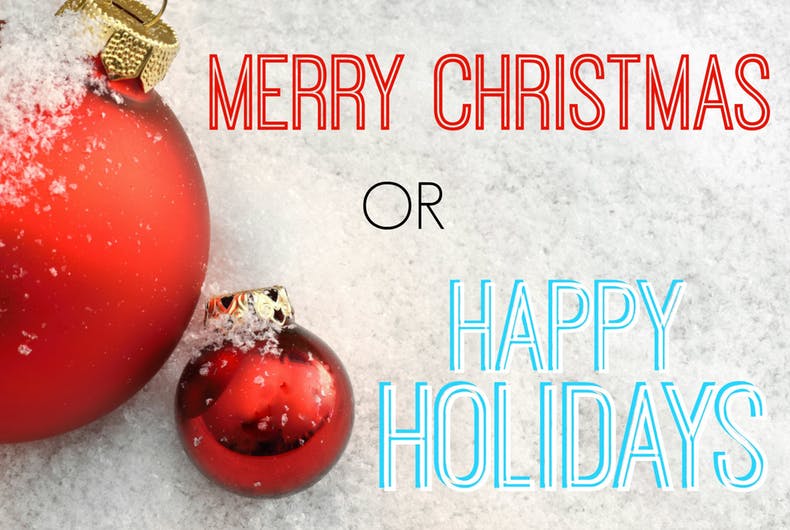
War on Christmas
I had a funny little conversation recently. I saw a meme I could only describe as something from one of those self-stroking conservative groups. I don’t know the political leanings of the person who shared it, nor do I care, but this meme threw me and I felt compelled to understand why it was shared [by zombies]*. *passive voice joke
Here’s the meme:
My mind raced with questions. First and more importantly, WHO is getting offended by hearing “Merry Christmas,” [premise of the meme]. Second, given the premise is valid [which I’m clearly skeptical about], who upon hearing someone is offended by something proceeds to repeat their antagonistic sentiment? Isn’t that textbook spiteful? At best, inconsiderate?
Completely anecdotal: I’m blessed to know my fair share of various religious practitioners, believers and followers of what we could classify as “world religions,” pagan or old religions, atheists, non-roman catholic religions, and a variety of my own Catholic faith as well. In order, the only fuss I have experienced, either in person or via my social media outlets, with regard to the words “Merry Christmas,” come from the latter two groups. Not scientific law, but factual observation. An undeniable correlation exists between the people who get worked up about a Starbucks cup and those who believe people are offended by the words “Merry Christmas.”
Caveat: If you have ever had someone of a world religion tell you they are offended by your sentiment of sincerely wishing them a merry Christmas, please pm me. I have questions.
Full disclosure, I’m a Catholic Christian. I celebrate Christmas. I have many memories of attending midnight mass and also believing in Santa for as long as my older brother could stand not ruining it for me. Siblings, am I right? I use “Merry Christmas,” and “Happy Holidays,” rather interchangeably. This was not a conscious decision, it just seemed right and, upon further reflection, aligns to my principles and values as a person and Christian. Here is what led me to this understanding.
First, I broke down what actually constituted the holiday season. Keep in mind my already religious perspective. The “holiday season” for me referred to the weeks leading up to the celebration of the birth of Jesus, so Advent.
Those of you who may not be familiar, Advent is the period of four Sundays before Christmas intended to prepare for the arrival of Jesus Christ. The four weeks are traditionally marked by candles, three purple which signify penance, and the final week, rose, signaling joy for the upcoming birth of Christ. While there are no particular rules for how to celebrate Advent, unlike Lent, it is still a period of preparation involving prayer, penance, and fasting appropriate during this season. For perspective’s sake, the reason for the season is really one of reflection, repentance, reconciliation, and rejoicing.
Wishing someone “happy holidays” to me always reflected the attitude of encouragement during a season of contrition and hope. Consider this when you see memes and comments below said memes stating “Merry Christmas,” and “God bless,” among other popular sayings in all CAPS, boldly verbalizing more self-satisfied sentiments, defeating the purpose of the expression itself and the season in which it’s expressed.
Happy Holidays also carries now the secular meaning, encompassing thoughts of well-wishes across several potential celebrations. If you haven’t picked up a dictionary lately, it is not uncommon for words to carry several definitions. So why the anger? The resentment? The fear mongering that Christmas is being taken away?! First off, people’s misunderstanding of equality contributes greatly, especially coming from a point of privilege. Going back to the original meme that sparked my curiosity, I know more people who get offended when they DON’T hear merry Christmas than the other way around.
Those who have irrevocably blended their faith with their politics have more to accommodate delivering this sort of empathy, because when you have had the bulk of the marketing and representation during this season, equality may seem like oppression or at the very least a loss of appearance, but trust me, it’s not. Equality doesn’t mean less for you, just more for everyone. There is no quota on compassion and joy, so you literally don’t have to worry about having less of it at the hand of someone else. Jewish practitioners are not thinking about you as they light their menorah, so you can rest easy knowing your freedom to practice your celebration of choice is safe, constitutionally and corporately.
In addition to my personal reflection, I realize I also don’t mind the secular version of “happy holidays” for a more allegorical reason. Apart from being Catholic, I also identify as Latina. Anyone who connects with Latin American origins can tell you, they have been called or referred to as “Mexican” at least once in their lifetime, regardless if they are or not. In my case, not. I don’t expect people to identify me as Salvadoran upon looking at me because nationality is an arbitrary marker anyway, but the assumption that ALL Latin Americans are “Mexican” is blatantly false and willfully ignorant. THAT is an example of something offensive.
If someone thinks I’m Mexican, I’m not offended, because there is nothing wrong with being Mexican, I just happen to not be. But when someone says, “same difference,” “whatever,” or even argue with me about it (yes that happened) when I politely redirect them to an accurate marker, THAT is offensive. If you are uncertain and still feel the need to label me, I [and I’d venture to say many] would prefer the accurate catch-all of “Latin American,” than the specific mis-categorization of “Mexican,” (unless otherwise accurate). It saves both parties potential embarrassment that usually causes the “labeler” to go into defensive mode and potentially offensive territory [for some reason].
Coming back from that lovely scenic route, “happy holidays” has more in common with “Latin American.” It’s an empathetic label that is still accurate, general though it may be. Why would you say “Merry Christmas” to someone wearing a kippah? You wouldn’t. It’s evident that they are Jewish observers. Either you are ignorant in the kindest way or plain rude if you did it with intention. Not all faiths have such distinguishing markers, and not all Jewish people wear a kippah. Not all Muslims wear hijabs. Not all Christians are nuns. The problem isn’t with the phrase, “Merry Christmas,” it’s with the assumption.
Obviously, if you see a priest collar, it’s a safe bet to wish him a “Merry Christmas.” Christians don’t usually have any distinguishing markers of our chosen faith. I don’t have to carry a nativity set everywhere I go to identify as a celebrant of Christmas. I don’t have to walk around with a Salvadoran flag everywhere (which wouldn’t help anyway because you’d have to know the flag and geography…things not explicitly taught to or remembered by most in the USA nowadays).
This particular defense of “happy holidays” boils down to whether you would call a Puerto Rican a Mexican on purpose, or if you think it’s ok to categorize 20+ Spanish speaking countries under the flag of one. If you do, I have bad news; the Starbucks cup this year doesn’t say “Merry Christmas.”
“So what, I can’t say ‘Merry Christmas’ at all anymore?!”
Again, no one is saying that. You want to wish someone a Merry Christmas, most people who do not celebrate it wouldn’t be upset. They may absent-mindedly say, “you too,” as a trained response to “have a good day.” They may nod politely and say nothing. They may respond with the more general “happy holidays,” or they may even educate you to their own beliefs. As the initiator, be open to either response because none of those are bad.
Others not observing your holiday doesn’t mean you can’t observe your holiday. It’s literally a non-issue. Consider what you would do if someone wished you a Happy Chanukah upon leaving a grocery store. Consider someone wishing you a Happy Kwanzaa upon leaving the doctor’s office. Would you assume they did it with malice? Do you assume they know you were a Christian? Do you take their wishes as an affront to your faith? Or do you walk out with a preoccupied, “you to!” only to realize in your car what had happened? Do you sheepishly nod, or perhaps do you humbly alert them to your differences? “Oh! I don’t celebrate <insert stated here,> but you have a happy <insert same stated holiday here>.”
Look, I take no issue wishing strangers happy holidays despite my belief in the birth of an immaculately conceived foretold savior of the world, because that savior believes in the law of love above all else. Bottom line, the “War on Christmas,” is a complete fabrication for politically conservative Christian propaganda and the reason for the season should not allow for such callous abuse of its primary expression of joy.
You May Also Like

Monday Musing – Sorting Hat
June 19, 2017
Ready Player One
August 20, 2020

